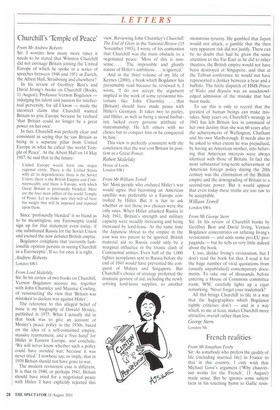From Lord Skidelsky Sir: In his review of two books
on Churchill, Vernon Bogdanor accuses me, together with John Charmley and Maurice Cowling, of 'resurrecting' the view that 'Britain was mistaken to declare war against Hitler'.
The reference to this alleged belief of mine is my biography of Oswald Mosley, published in 1975. What I actually did in that book was to give an account of Mosley's peace policy in the 1930s, based on the idea of a self-contained empire. massive rearmament. and a 'free hand' for Hitler in Eastern Europe, and conclude. 'We will never know whether such a policy could have avoided war, because it was never tried.' I nowhere say, or imply, that in 1939 Britain should not have gone to war.
The modern revisionist case is different. It is that in 1940, or perhaps 1941, Britain should have tried for a negotiated peace with Hitler. I have explicitly rejected this
view. Reviewing John Charmley's Churchill: The End of Glory in the National Review (15 November 1993), I wrote of his contention that Churchill was the main obstacle to a negotiated peace: 'Most of this is nonsense. . . . The impossible and ghastly nature of Hitler's ambitions. . . is ignored.'
And in the third volume of my life of Keynes (2000), a book which Bogdanor has presumably read because he reviewed it, I wrote, 'I do not accept the argument implied in the work of some revisionist historians like John Charmley . . . that [Britain] should have made peace with Hitler's Germany. It takes two to parley, and Hitler, as well as being a moral barbarian, lacked every genuine attribute of statesmanship. He left others with no choice but to conquer him or be conquered by him.'
This view is perfectly consistent with the conclusion that the war cost Britain its position as a Great Power.
Robert Skidelsig
House of Lords, London SW1


























































 Previous page
Previous page